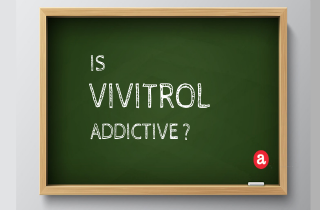No. Vivitrol is not addictive.
Vivitrol, an injectable form of naltrexone, actually helps alcoholics in the process of getting sober and maintaining sobriety. Vivitrol blocks the pleasurable effects that alcohol triggers and also stops alcohol cravings. So, although getting sober isn’t easy, (it may be one of the hardest habits to kick), Vivitrol helps by making this process easier.
Continue reading here to get a better understanding of Vivitrol therapy for alcohol addiction. If you have any uncertainties or questions in the end, you can post them in the comments section below. We appreciate your feedback and try to answer all legitimate inquiries in a personal and prompt manner.
What is Vivitrol used for?
Vivitrol is used in the treatment of alcoholism in people who have successfully abstained from alcohol for some time. Vivitrol helps recovering alcoholics to manage the alcohol cravings and it also lowers the risk of having a relapse. However, Vivitrol treatment should be a part of a complete management program which includes psychotherapy and behavioral therapy. Further, Vivitrol is most successful when patients completely stop drinking alcohol. Although Vivitol is a potent opioid antagonist, it is not indicated for the purpose of opioid blockage in the treatment of opiate dependence.
What is Vivitrol made of?
Vivitrol is an injectable form of naltrexone, which is an opioid antagonist. Naltrexone has opioid blocking properties and has a highest affinity for binding in the mu-opioid receptor. More importantly, it seems to stop alcohol cravings in alcohol-dependent individuals. It is actually the naltrexone in Vivitrol that blocks the chemical responses that make alcohol rewarding. By acting in such way, Vivitrol gives people the needed physical support to stay sober and be focused on completing a comprehensive recovery program. Although its mechanism of action for alcohol dependence is still not fully understood by scientists, Vivitrol (naltrexone) is a proven medication with many benefits for those who are eligible for treatment.
Vivitrol for alcohol dependence
According to the Center for Disease Control (CDC) statistics, alcohol dependence or alcoholism is among the leading causes of death in the U.S. It’s actually number three (3) on the list of lifestyle-related causes of death in the country, accounting for about 79,000 fatalities each year.
If you or a loved one drink bigger amounts of alcohol, chronically or on day-to-day basis and want a new way of life, medications like Vivitrol can help. While quitting alcohol isn’t easy and can cause adverse withdrawal symptoms, it is a thing that can be done. You can seek help from a doctor, who can further refer you to a local treatment hospital or a detox center. After you detox, staying sober is one of the hardest things. Alcohol may be out of your system, but your brain will still crave for it. This is the point at which this medication to help you stop drinking can help.
How addictive is Vivitrol?
Vivitrol is not at all addictive. Vivitrol may not be the one-stop cure for alcoholism, but it can help recovering alcoholics stay alcohol-free along the alcohol detox timeline. Used as a part of an overall program that may include family or individual counseling, support groups, cognitive-behavioral therapy, educational sessions, lifestyle changes, adequate support system and other treatments that fit your needs.
Deciding to take Vivitrol
Vivitrol works by interfering with the brain’s desire for alcohol and has helped many recovering alcoholics. Making the decision to use Vivitrol should be made along with your doctor or counselor. Here we’ll review the advantages of Vivitrol but we also explain the reasons why this medication may not be a fit for some individuals.
+PRO’s
1. Vivitrol drastically reduces cravings for alcohol
2. Used along with a structured treatment program, it can lead to lasting sobriety
3. Decreases the risk for relapse by making alcohol undesirable
4. Vivitrol is a safe, supervised method of treatment
5. Vivitrol injection is taken once a month and does not require daily dosing
– CON’s
1. Vivitrol is very expensive (< $1200 each month), even with private insurance that covers prescriptions drugs
2. Vivitrol treatment can only be initiated after all alcohol and opiates are out of patient’s system
3. Vivitrol is FDA approved for individuals who are 18 or older
4. There are possible side effects with Vivitrol, just like with any other medication
5. Vivitrol can make patients more sensitive to opiates and lead to overdose if opioids are taken
Vivitrol questions
If you are currently making the decision for using Vivitrol as a part of your alcohol treatment program, we hope the information we provided in this article can help you understand the full picture. Although the decision for initiating Vivitrol treatment is individual, it should be made with a doctor that understands your condition and the effects of the medication.
For any questions please contact us here. Or, post your comments in the section below and we’ll get back to you with a personal and prompt response.









Related Posts